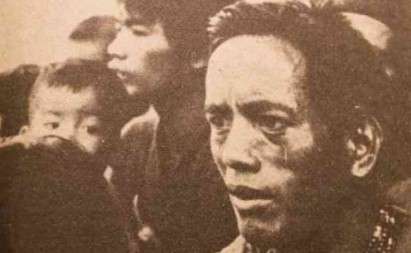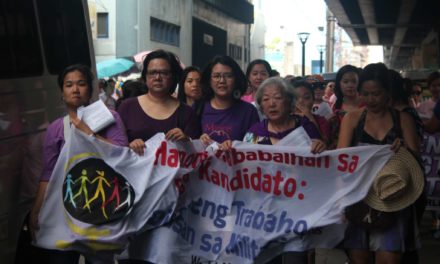By Clarissa V. Militante, 24 May 2014
More than 30 years after soldiers under the Marcos regime killed Macli-ing Dulag because he led the Cordillera communities’ resistance against construction of dams in the Chico River, the attacks on indigenous peoples have become more and more blatant in recent years in the context of heightening conflict over resources.
On one hand there are corporations grabbing land and taking control of resources that are not only economically important to ethnic communities but sustain the very core of who they are and how they have lived from the time of their ancestors. Opposing these are IP communities defending their ancestral lands, their cultures, their lives. Under the reigning culture of impunity in the Philippines, still unsolved are the extra-judicial killings of two children of Anteng Freay, a B’laan leader whose house was strafed by gunmen in August 2013; the ambush by gunmen-in-motorcycle of Subanen tribal chief Lucenio Manda in September 2012, resulting in the death of his 11-year old son; the killing of Judy Capion, pregnant wife of Dagil, tribal leader accused of being a rebel/bandit, and their two sons in October 2013. This last was allegedly perpetrated by soldiers, and the case has not moved because the crime scene had been cleaned up before the police investigators arrived. And yet this is not an exhaustive list of IP leaders and their families who have been hurt, harassed or killed in recent years as they defended their lands and communities against corporate mining enterprises and other forms of development aggression.
The expression of indignation, the mobilization for political actions to seek justice have not relented especially because of lack of decisive response from government. These are critical steps. But the fight for justice will not be complete if we only claim it on behalf of the deaths. We commemorate Macli-ing Dulag and protest the killings of indigenous peoples, but we continue to marginalize their life principles, their cultures and histories, which were their main motivations in defending their lands and community resources. But this marginalization, this refusal to understand an alternative paradigm borne out of indigenous people’s praxis, this failure to make those connections is what sustains corporate-led aggression in IP communities and a culture of impunity. Their lands—and way of life—still seem to us distant geographies, especially from where we lead our lives in the urban centers.
We can instead remember Macli-ing Dulag and what he continues to stand for, and those who have fought for their ancestral lands against corporate domination and greed, with an expanded awareness of what their struggles and death represent—this awareness which can be inspired by buen vivir. Vivir bien or buen vivir, a Spanish phrase that can mean “living well,” “good life,” “knowing how to live,” “inclusive life,” or “sweet life,” embodies the indigenous peoples in South America. Says the publication From Latin America to Asia, Learning from Our Roots: A Conversation on Vivir Bien (published in 2013 by Focus on the Global South), this way of life should not be confused “as a utopian return to the pre-colonial past,” but be understood as the “merging of lessons from the past with those of today to build something new.” This philosophy is in stark contrast with the way of life bred by the capitalist system; living better is not brought about by living with more material things. The so-called right to development is interrogated; the idea that the capitalist system’s way is the only way to development challenged. Buen vivir is a way of life underlined by certain principles, such as “bio-society versus human society, humanism vs. individualism, complementarity vs. competition, harmony vs. growth, integrality vs. materiality,” which stress that the goal of humans “is not to control nature but take care of it”; that our place is not at the center, as we co-exist with nature. In Bolivia and Ecuador, this principle is not just a proposition, but is already embedded in the countries’ constitutions.
But this alternative paradigm also resonates to IPs in the Philippines. When a forum on buen vivir organized by Focus on the Global South took place in Manila last year, the Subanen women who participated in the event immediately explained it in their own terms; they were able to relate to the idea that man/humanity is not at the center of things. They explained their practice called maguras, a ritual performed with the aim of asking permission from the guardian spirits to utilize Mother Earth’s resources. They stressed that there should be no dichotomy between the practice of their culture and progress; that a good life for many can only be sustained if nature is not used in harmful ways. But for many who have been so habituated to a consumption-oriented, anthropocentric life, this view is strange, even laughable.
Even among the politically progressive sectors and formations, the IP perspectives are sometimes marginalized, their way of life as something to build on in engendering alternative paradigms often not considered or become mere afterthoughts to give credence to claims of being democratic and politically correct. We still carry within us the colonial thinking we so much despise that theirs is a backward conception of life and the universe and to use their paradigm is some form of recidivism. But as the Avidasi of India claim about their egalitarian communities where there is equality not only among humans but with humans and the forest, “We are not 200 years backward, we are 200 years advanced.”
Ms. Militante works at Focus on the Global South; she is also author of the novel Different Countries (Anvil, 2010).
Published by Interaksyon on April 24. Photo courtesy of Interaksyon.






![[IN PHOTOS] In Defense of Human Rights and Dignity Movement (iDEFEND) Mobilization on the fourth State of the Nation Address (SONA) of Ferdinand Marcos, Jr.](https://focusweb.org/wp-content/uploads/2025/07/1-150x150.jpg)



